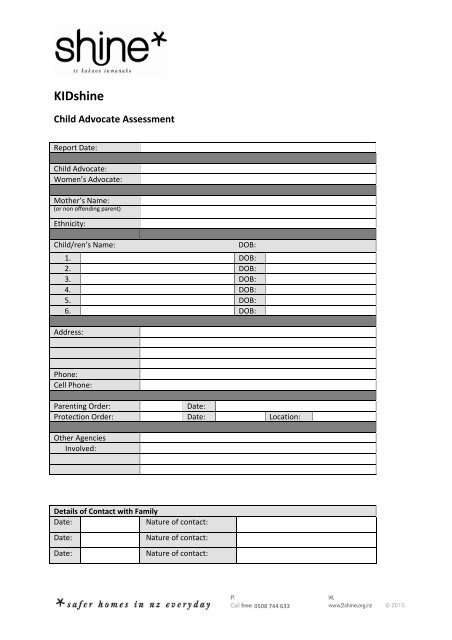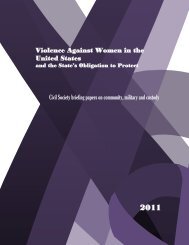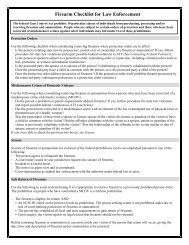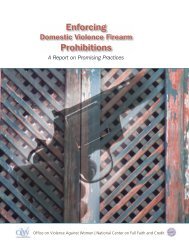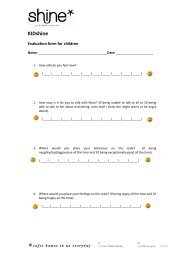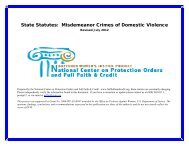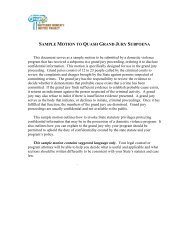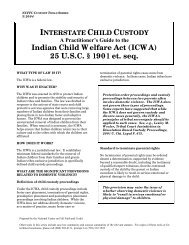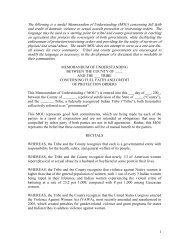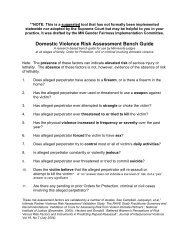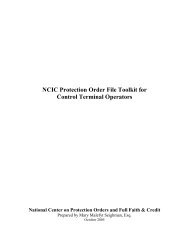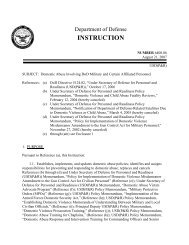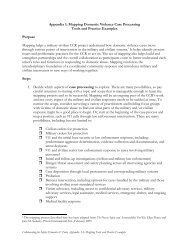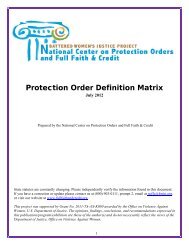Child Advocate Assessment Form
Child Advocate Assessment Form
Child Advocate Assessment Form
Create successful ePaper yourself
Turn your PDF publications into a flip-book with our unique Google optimized e-Paper software.
KIDshine<br />
<strong>Child</strong> <strong>Advocate</strong> <strong>Assessment</strong><br />
Report Date:<br />
<strong>Child</strong> <strong>Advocate</strong>:<br />
Women’s <strong>Advocate</strong>:<br />
Mother’s Name:<br />
(or non offending parent)<br />
Ethnicity:<br />
<strong>Child</strong>/ren’s Name:<br />
DOB:<br />
1. DOB:<br />
2. DOB:<br />
3. DOB:<br />
4. DOB:<br />
5. DOB:<br />
6. DOB:<br />
Address:<br />
Phone:<br />
Cell Phone:<br />
Parenting Order:<br />
Date:<br />
Protection Order: Date: Location:<br />
Other Agencies<br />
Involved:<br />
Details of Contact with Family<br />
Date:<br />
Nature of contact:<br />
Date:<br />
Date:<br />
Nature of contact:<br />
Nature of contact:<br />
0508 744 633
Current Situation<br />
Background information e.g: Whether the mother and father are living together, history, present<br />
situation, including access etc.<br />
<strong>Child</strong>’s Account of What they saw<br />
Sometimes when parents fight they get angry … maybe too angry and they may start to yell at each<br />
other, or even hit each other. We know this is scary for children. I want to ask you a few questions<br />
about when your parents fight and what you think about it.<br />
A few days ago there was a big fight, tell me about what happened then.<br />
What kinds of things do Mum and Dad (boyfriend, partner) fight about? Do they fight very often?<br />
What usually happens when there is fighting? Do they yell at each other? How does the hitting usually<br />
start?<br />
“That must have been really scary, you are so brave.” Tell the child that no one deserves to be hurt<br />
or frightened and what is happening is not their fault.<br />
Impact of Exposure to Violence<br />
Do you find that you think about your parents fighting a lot? (When do you think about it? What do you<br />
think about?)<br />
Do these thoughts ever come in school or while you are playing?<br />
Why do you think there is so much fighting?<br />
Do you ever have trouble sleeping at night? Why? Do you have nightmares?<br />
What would you like to see happen to make it better?
<strong>Child</strong>’s Safety Concerns<br />
What do you do when there is fighting in the home?<br />
stay in the room<br />
go to older sibling/relative Who?<br />
leave / hide<br />
ask parents to stop<br />
phone someone Who?<br />
run out / get someone<br />
other. What?<br />
Do you ever get hit or hurt when there is fighting?<br />
What happens when Mum or Dad get angry with you?<br />
Who makes the rules at your house? What happens if you break the rules?<br />
Is there anything else worrying you that you would like to talk to me about?<br />
Support for the <strong>Child</strong> – Social Atom<br />
Who in your family do you get along well with?<br />
Who is the person that you talk to most?<br />
Who are the people you know you can go to for help? (ie: Mum, Aunty, teacher, neighbour, friend or<br />
friend’s Mum, big sister etc) Do you see them often?<br />
How could they help you when you feel scared or upset?<br />
(Does child have a social network amongst peers – at school/kindy and in the neighbourhood?)<br />
Discussion with the Mother (in private from child)<br />
(Note: This section may be covered by the Women’s <strong>Advocate</strong>)<br />
Discipline<br />
When women are experiencing abuse or have experienced abuse, the constant emotional stress can<br />
affect their ability to parent their children. Also a common reaction when children know that violence is<br />
happening is that they become more difficult for their mother to parent them.<br />
<strong>Child</strong>ren sometimes become more difficult to parent, are you experiencing this? Do you find the children<br />
are really naughty at times?<br />
How do you cope with this?<br />
Do you ever worry about your children’s safety when they are with you? Do you smack them a lot?<br />
Is there anything from your past or your childhood that makes you anxious about parenting?<br />
How do you feel about your relationship with your child/ren?
Parenting Strategies Suggested<br />
Have a discussion about how she parents her child/ren, what is working well for her and what doesn’t.<br />
What parenting strategies do you try to implement to get your children to behave?<br />
Effect of Domestic Violence on child<br />
Discussion about the effects of witnessing/hearing the d.v with mother.<br />
What changes, if any, have you noticed with the children and what meaning have you put on it?<br />
What does your child/ren over hear or has overheard that is/was inappropriate?<br />
How much do you discuss your concerns/problems regarding your relationship with their<br />
father/stepfather with the child/ren? ie: as if they were mutually supportive peers, rather than parent<br />
and child.<br />
Support for Parenting<br />
Where do you get support for your parenting? i.e: Kindy, friends, her family etc<br />
How do they help you? Do they know about the violence? Could they provide more support to you and<br />
the child/ren?<br />
(Also, who is really unsupportive of her parenting, undermining her etc)<br />
Who looks after the children when you are not at home?<br />
How tired are you – are things getting on top of you?<br />
Do you need a break? Who could help with this? (ie: after school activities for the children, Barnardos<br />
etc)
Creating a Safety Plan<br />
<strong>Child</strong> safety plans should make it possible for children to know in advance what to do, rather than<br />
waiting until they are right in the middle of a terrifying incident to try and work out what to do. They<br />
need to be based on the possibility that violence may happen again and its smart to know what to do in<br />
advance. The child should be assisted to create a plan that has a reasonable chance of working, given<br />
the limitations of their situation. However, it is vital that they be given permission NOT to act if they<br />
decide it is too dangerous or they are too frightened – they are a child and adults always have more<br />
power to stop them. They also need to know that it is neither safe, nor their responsibility to try and<br />
protect their mother.<br />
Ideally, the mother should be present and assist with developing a plan. The child needs to know that<br />
their mother understands and supports whatever action they take.<br />
Example questions for the mother:<br />
Are there particular times or places where her child/ren are more at risk? (ie during access, the<br />
weekend)<br />
What has she tried in the past to keep her children safe when violence is occurring?<br />
What do you believe would help keep you and/or your children safe?<br />
Are there any things you think you could teach your child to do, next time violence occurs?<br />
ie:<br />
go to a neighbour’s house<br />
go into a different room<br />
phone 111 and how to do this – does child know address, phone number?<br />
If the mother is separated from the abusive person, the child needs to be taught what to do if the expartner<br />
makes contact with them unexpectedly (ie checking before opening the door; telling a teacher if<br />
they are approached at school); or takes them (ie calling 111). Other adults who care for the child (ie<br />
childcare staff, teacher, aunt, babysitter) need to be told which people have permission to pick them up.<br />
Example Questions for child:<br />
If it happens again, do you think you would be safest inside or outside the house?<br />
If you stayed inside, would your room be the best place or somewhere else?<br />
If you went outside would you try and find an adult or not?<br />
Would it be an adult you already knew? Who?<br />
How would you get outside?<br />
What would you take with you?<br />
If you wanted to use a phone, would it be best to do it at your house or somewhere else?
What is the Agreed Safety Plan?<br />
Other Resources Required and/or follow‐up for Area <strong>Advocate</strong>:<br />
Referrals Made and/or Action Plan:


